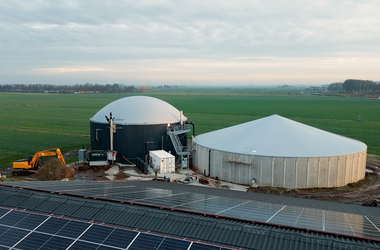
Van mest naar groen gas bij Vissergas Holding
Wijckel, Friesland

Fermentation is the conversion of biomass into biogas (or green gas) by means of bacteria and fungi. Fermentation plays a major role in the energy transition. We have an intricate and extensive gas network in the Netherlands. This gas network can be used for green gas without any modifications. In addition, biomass fermentation can play a role in greening the transport sector.
About 100 million cubic meters of green gas are now produced annually in the Netherlands. Around 60,000 households are already using green gas.
A digester produces biogas from biomass. A menu is created for optimal conversion of input (biomass) into the desired output (biogas). In bio-digestion, bacteria and fungi take care of biomass conversion. There are different types of biomass suitable for fermentation. These can be divided into plant material and organic waste streams, such as:
Biogas is a renewable gas which consists of approximately 60 percent methane. In addition, biogas contains a large amount of CO2 and a small amount of sulfur. In comparison, Groningen (natural) gas consists of approximately 88 percent methane.
In theory, the operation of a biodigester is quite simple. Through the fermentation of biomass, you produce biogas. The biogas produced can be used in a variety of ways. With a combined heat and power (CHP) system, biogas can be converted into heat and electricity. In addition, you can use biogas in gas boilers to produce heat.
It is also possible to make a gas with the same quality as the natural gas in the Dutch gas grid. To do this, the biogas is cleaned and the methane content is brought to the same level as in natural gas. We call this green gas. This is fed into the gas grid and used by households, offices and other businesses.
Green gas can also be used as transportation fuel in your car. This is also called Bio-CNG in some cases. Strong cooling of green gas creates a liquid fuel with a high energy density called Bio-LNG. This can be used in heavier forms of transportation, such as trucks and ships.

There are many different forms of fermentation. They can be divided into the following 4 categories:
All-digestion is the fermentation of residual streams. These residual streams must produce a minimum of 25m3 of gas per ton. An example of all-purpose fermentation is organic waste fermentation. This involves using vegetable waste streams, such as garden waste, to generate biogas. The products that can be used for all-purpose fermentation are listed in the "Classification of biomass for energy application" (NTA8003). Compound fermentation is becoming more and more common. This is mainly due to the introduction of new techniques. These ensure that materials that were previously difficult to ferment can now be fermented efficiently. An example of this is all fermentation using only verge grass. This was previously not possible, but preliminary results show that by applying certain bacteria there is great potential in verge grass fermentation.


Manure fermentation is the fermentation of only one product in a digester, namely manure. Manure fermentation is also called mono-manure fermentation. Here, the plant is fully optimized to generate as much energy from manure as possible.
Manure fermentation is mainly used by livestock farmers. They can get many benefits from this form of fermentation.
Co-digestion, also called co-digestion, is the fermentation of residual streams of which at least 50% is animal manure. Co-digestion is the most common type of digestion in the Netherlands.
The digestate that remains after digestion is considered animal manure. Products used in the digester must therefore be on the Aa list of the fertilizer law.

Are you curious about the possibilities that fermentation offers for your business? Or do you want to realize a digester? Then we would like to help you.
Ekwadraat specializes in making ambitious digestion plans feasible. We calculate for you whether fermentation is possible in your situation and how you can realize a profitable project.
We also guide you in realizing the installation, for example by applying for the necessary permits and subsidies. How can we help you? Please contact us.
Are you curious about the possibilities for applying fermentation in your company? Or do you want to realize a digester? Then get in touch.
"Curious about the possibilities of fermentation in your situation?"
Senior adviseur